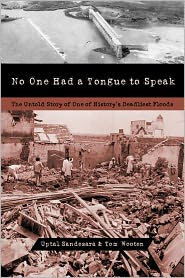New from Prometheus Books:
No One Had a Tongue to Speak: The Untold Story of One of History's Deadliest Floods by Utpal Sandesara and Tom Wooten.

About the book, from the publisher:
On August 11, 1979, after a week of extraordinary monsoon rains in the Indian state of Gujarat, the two mile-long Machhu Dam-II disintegrated. The waters released from the dam's massive reservoir rushed through the heavily populated downstream area, devastating the industrial city of Morbi and its surrounding agricultural villages. As the torrent's thirty-foot-tall leading edge cut its way through the Machhu River valley, massive bridges gave way, factories crumbled, and thousands of houses collapsed. While no firm figure has ever been set on the disaster's final death count, estimates in the flood's wake ran as high as 25,000.
Despite the enormous scale of the devastation, few people today have ever heard of this terrible event. The Guinness Book of World Records and a few obscure articles contain the scant publicly available information about it.
No One Had a Tongue to Speak tells, for the first time, the suspenseful and multifaceted story of the Machhu dam disaster. Based on over 130 interviews and extensive archival research, the authors recount the disaster and its aftermath in vivid firsthand detail. The book progresses sequentially, beginning with a centuries-old folktale that foretells Morbi's destruction and ending with an examination of the flood's present-day legacy in the lives of its survivors. Whenever possible, the story of the flood and its aftermath is told through the voices and viewed through the eyes of the people who survived the devastation. Moreover, the book presents important findings culled from formerly classified government documents that reveal the long-hidden failures that culminated in one of the deadliest floods in history.
The authors follow characters whose lives were interrupted and forever altered by the flood, provide vivid first-hand descriptions of the disaster and its aftermath, and shed light on the never-completed judicial investigation into the dam's collapse. With its suspenseful plot, compelling characters, and moving nonfiction narrative, No One Had a Tongue to Speak reads more like a novel than a nonfiction account, revealing the profound human tragedy behind the dry statistics and painting a vivid portrait of an India torn between its feudal past and its industrial future.
 About the book, from the publisher:
About the book, from the publisher: